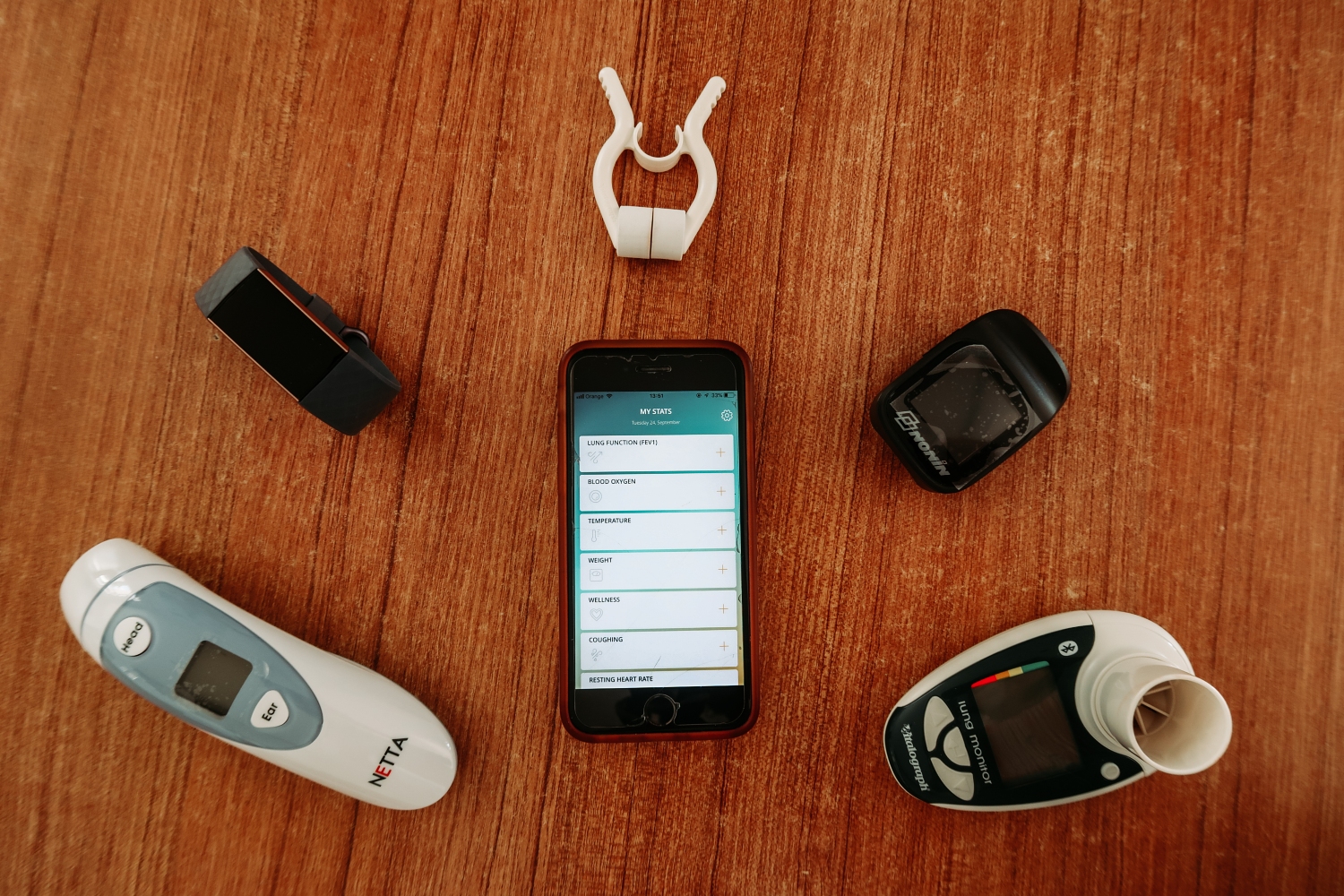Home monitoring for patients with cystic fibrosis (CF) has rapidly expanded during the coronavirus (COVID-19) pandemic, improving people’s health and reducing the number of hospital visits.
CF is a genetic condition that weakens the lungs and affects the digestive system. Historically a visit to the hospital had been the only way for a clinical team to monitor their patients' health, and, even before COVID-19, patients would have to wear masks when in hospital to protect themselves from picking up infections which would be far more damaging for them than people without CF.
That was one of the reasons behind the launch of a first-of-its-kind study at Royal Papworth Hospital, called Project Breathe, in February 2019, which allowed people with CF to monitor their health at home.
Patients are allocated devices – such as a FitBit and electronic scales - that measure key indicators such as lung function, blood oxygen levels, weight, sleep and temperature, and then upload the results via a smartphone.
That data is then uploaded to an app on their phone and sent to the hospital, enabling clinicians to view each individual’s data at virtual clinics and face-to-face appointments.

Some of the Project Breathe kit: a smartphone, FitBit, thermometer and spirometer.
By tracking their own health, patients can also intervene earlier and potentially head off serious, lung-damaging infections.
“People with cystic fibrosis spend a lot of time in hospital, both as inpatients and outpatients. We know that a lot of those outpatient appointments can be avoided with the right technology,” said Rachel Godfrey, Cystic Fibrosis Research Sister.
“A patient’s nearest CF centre can be some distance away, meaning a full day of travel and tests, leading to fatigue and therefore poor performances in the metrics we measure and, subsequently, sometimes misleading information about their health.
“This creates a catch-22 situation; people with CF can sometimes feel that their clinical results do not reflect how they are truly feeling, and even begin to get pre-appointment anxiety, negatively impacting their scores even further.
“Multiple hospital visits can also have financial and time implications: patients can attend clinic but are completely stable and have unnecessarily taken a day off work, school, or annual leave and have spent money on petrol.
'Project Breathe saves times and money for patients and the hospital'
“Through Project Breathe, we not only monitor our patients’ key indicators each day, and therefore have more reliable data about their health, we can cancel some appointments because we know the patient is ok and safer at home. This saves time and money for both the patient and the hospital, but more importantly improves patient care.”
The study is also reducing the number of days that cystic fibrosis patients spend in hospital for intravenous antibiotic treatment.
Once participants have home monitoring equipment they are given the option to consent to their data being analysed by machine learning experts at the University of Cambridge and Microsoft Research. The data is stored in the cloud and develops early warning algorithms, using a predictive model to determine when patients are becoming sick long before they begin to feel unwell.
“As well as avoiding the usual clinic attendances, early results show that the model can identify a decline in a patient’s condition an average of 11 days earlier than antibiotics would typically be started,” explained Professor Andres Floto, Professor of Respiratory Biology at the University of Cambridge and an Honorary Consultant Physician at Royal Papworth Hospital.
“Virtual clinics and home monitoring has surged in use across the NHS during the coronavirus pandemic. Project Breathe has been ahead of the curve in that respect.
“If we can also intervene earlier, we should be able to protect patients – in this case their lungs - from long-term, ongoing damage.”
'We can identify a decline in a patient's condition 11 days earlier'
In the first 12 months, 97 people were recruited to Project Breathe at Royal Papworth Hospital; further funding has now allowed more than 220 patients to have access to the full range of home monitoring equipment.
Although not all of them are enlisted on Project Breathe, they are all supported by the team and are able to escalate any concerns with their data to the CF team from the comfort of their own home.
And Project Breathe has expanded significantly not only within the UK, but internationally too.
By early 2021, four hospitals sites in the UK are offering Project Breathe to people with cystic fibrosis, with Cardiff, Glasgow and Edinburgh joining Royal Papworth Hospital. A multi-site centre in Canada is also currently in the process of recruiting to Project Breathe.
Project Breathe is a collaboration between Royal Papworth Hospital, the Cystic Fibrosis Trust, the University of Cambridge, Microsoft Research, and social enterprise project Magic Bullet.
Funding for Project Breathe is provided by Health Data Research UK, US Cystic Fibrosis Foundation, Chiesi and Roche.
Useful links
Project Breathe patient case study
Project Breathe troubleshooting
How a cloud-based solution is transforming care for people with cystic fibrosis
